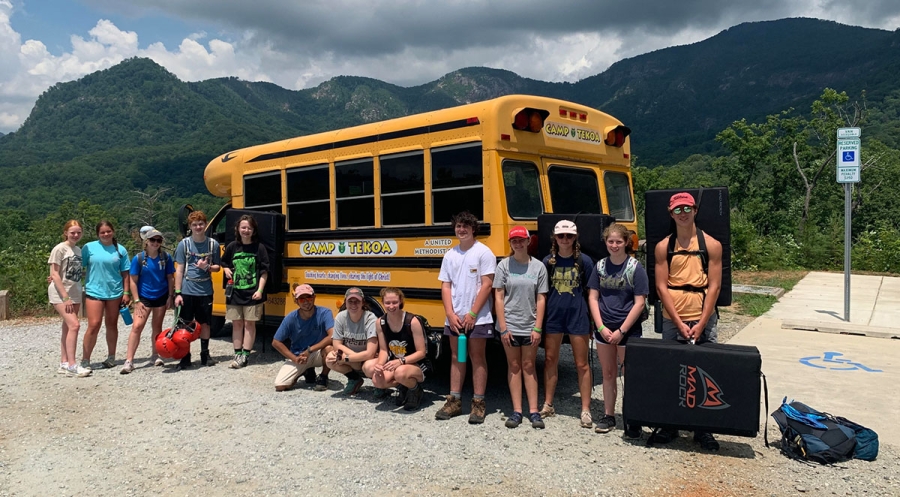The simple pleasure of spending time together, whether it's collaborating on a creative project or cheering for a team during a spirited competition, creates a profound sense of connection that transcends the campfire's glow. These friendships become the foundation for countless memories and inside jokes that campers carry with them long after the summer sun has set.
In the realm of summer camp, routine is replaced with adventure and the mundane with the extraordinary. Each day brings an opportunity to embark on new journeys, whether it is conquering a climbing wall, performing in a talent show, or navigating the twists and turns of a nature trail.
The joy of discovering new passions and talents is palpable as campers learn to embrace challenges and push their boundaries. With every laugh, every high-five, and every shared triumph, summer camp becomes a treasure trove of happiness—a place where the pure joys of childhood are celebrated and cherished, creating memories that brighten even the cloudiest of days.
Summer Camp and Its Many Benefits
Even though every camp is different, there are common themes that come up when talking to students, parents, and staff members about the benefits of summer camp. Summer camp is a special environment where kids come together to have fun, and they offer a wide range of benefits for participants of all ages. Here are ten benefits of attending a summer camp:
1. Skill Development
Summer camps offer a diverse range of activities, from arts and crafts to sports, water activities, and outdoor adventures. Campers have the chance to immerse themselves in activities they might not have tried before, allowing them to discover new talents and passions.
2. Social Interaction
Camps provide a controlled environment for campers to interact with their peers, helping them learn important social skills such as effective communication, teamwork, and conflict resolution. These interactions can lead to the formation of lasting friendships.
3. Independence
Being away from home and family for an extended period encourages campers to become more self-reliant. They learn to make decisions on their own, manage their daily routines, and navigate challenges, fostering a sense of independence and personal responsibility.
4. Outdoor Exploration
Many camps are situated in natural settings, giving campers the opportunity to connect with nature. Engaging in outdoor activities like hiking, swimming, and camping can promote an appreciation for the environment and encourage a healthier, more active lifestyle.
5. Confidence Building
Overcoming challenges and trying new activities at camp can significantly boost campers' self-esteem. When they accomplish tasks they initially thought were difficult, it empowers them to believe in their abilities and take on more challenges in the future.
6. Cultural Exposure
Camps bring together individuals from diverse backgrounds, fostering a sense of inclusivity and cultural awareness. Campers learn to appreciate different traditions, languages, and perspectives, promoting tolerance and understanding.
7. Unplugging From Technology
Camps offer a break from the constant influx of screens and digital distractions. This allows campers to engage in meaningful face-to-face interactions, develop their creativity, and reconnect with the world around them.
8. Leadership Skills
Many camps offer leadership programs for older campers. These programs provide opportunities for campers to take on leadership roles, mentor younger peers, and lead group activities. Such experiences contribute to the development of valuable leadership skills.
9. Conflict Resolution
Living in close quarters with others can lead to conflicts, but camps provide a safe space to learn how to navigate disagreements constructively. Campers learn to communicate effectively, practice empathy, and find solutions that benefit everyone involved.
10. Memorable Experiences
The unique blend of activities, traditions, and camaraderie at summer camp often results in unforgettable experiences. Campers create lasting memories, and the connections they form can become lifelong friendships that continue beyond their time at camp.
Overall, summer camps provide a holistic and enriching environment that promotes personal growth, skill development, and meaningful connections with others. Campers gain not only skills and knowledge but also life skills that prepare them to thrive in various contexts as they grow into adulthood. Each camp is unique in its offerings, but these benefits are often found across different types of camps.
Camp Tekoa
Camp Tekoa is an overnight summer camp full of adventure. Amongst the benefits listed above, we have many activities campers enjoy daily. Some of those activities include:
- Three-Acre Lake
- Canoes and Paddle Boats
- Fishing, Swimming
- Diving dock and marked shallow area for non-swimmers
- Sand Beach Area
- High Ropes Course
- Ziplines
- 40' Climbing Tower and Mini Climbing Wall
- Tree Climb
- Rope Swing
- Hiking Trails - including Meditation Trail
- Challenge Course
- Climbing Tower
- Campfire circle
- Outdoor chapel
- Activity Field with Soccer Goals
- Outdoor Basketball Court
- Picnic Shelter
- Playground
- Disc Golf Course
Camp Tekoa is a summer camp and conference center located in the Blue Ridge mountains of North Carolina. We offer a wide variety of summer resident and day camps for boys and girls. These include elementary day camps and resident camps for elementary, middle school, and high school students. We also offer Adventure Camps for middle and high school students.
Our mission at Camp Tekoa is “Touching hearts, changing lives, sharing the light of Christ.” Camp Tekoa is built on Christian principles. Everything we do is built around our mission, and our focus on spiritual growth is one of the things that make us unique. Every child is valued and belongs here.
Camp Tekoa is the perfect place for your child to grow and experience all the benefits of overnight summer camp. For more information about registering your child for Camp Tekoa, contact us or visit our website.
